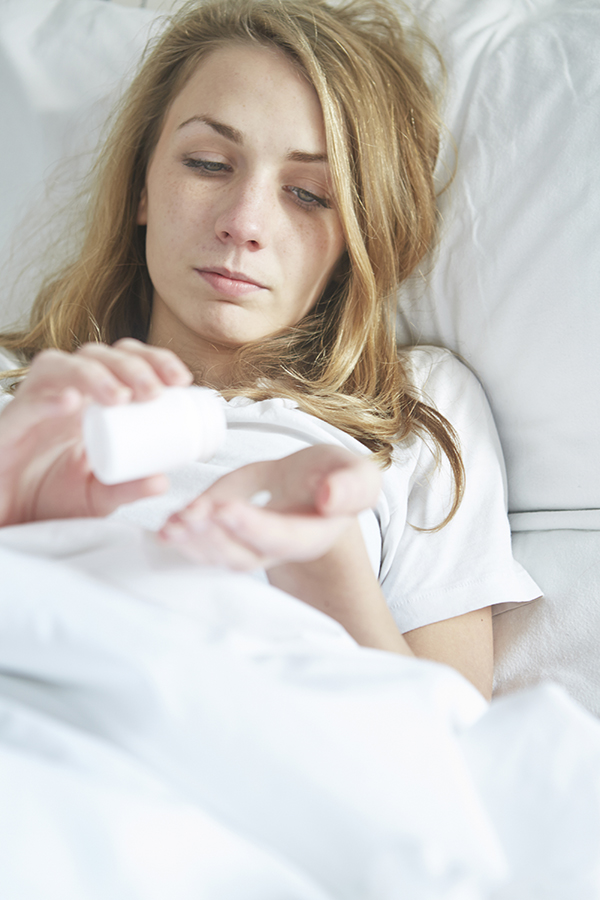
(This content is being used for illustrative purposes only; any person depicted in the content is a model)
Author: Justin Mckibben
Some people still fail to appreciate the reality of a concern with teen abuse of ant-anxiety and sleep drugs as a relevant issue affecting young people today. Yet according to several studies, prescribing anti-anxiety and sleep medications to teens has increased over the past decade, along with abuse of these drugs. A 2011 survey by the Substance Abuse and Mental Health Services Administration estimated that 3 percent of adolescents in the United States abuse these medications.
Teen abuse of anti-anxiety and sleep drugs usually starts with a prescription, and most teens prescribed these kinds of medication are more likely to abuse them later (compared to those who had never had a prescription). Most teen abuse of anti-anxiety and sleep drugs has been reported to start with casual use of these kinds of medications to self-treat insomnia or anxiety, and evolves into an attempt to get “high” with a reasonable alibi or excuse.
Teen Abuse of Anti-Anxiety and Sleep Drugs: How it starts
The first longitudinal study to examine nonmedical use and medical misuse of anxiety and sleep medications among adolescents was conducted by scientists at the University of Michigan and funded by NIDA and NCATS. The findings highlight the need for prevention strategies targeting youth who may be at risk for prescription medication abuse.
Data was collected from adolescents attending 5 Detroit area secondary schools between December and April in 3 consecutive academic years between 2009 and 2012.
- Almost 9% of the sample had received a prescription for anxiolytic or sleep medication during their lifetime
- 4% had received at least 1 prescription during the 3-year study period
- Compared with adolescents never prescribed anxiolytic or sleep medication, adolescents prescribed these medicines during the study period were 10 times more likely to engage in nonmedical use for reasons such as “to get high” or “to experiment”
Teen abuse of anti-anxiety and sleep drugs starts off similar to how most forms of prescription drug abuse in young people does. Someone is in need of medication and receives it, during which period they begin to abuse it for a ‘high’, and that creates a habit that can form into a much more dangerous addiction.
Teen Abuse of Anti-Anxiety and Sleep Drugs: Dangerous Prescriptions
A lot of teen abuse of anti-anxiety and sleep drugs begins when young people are prescribed potentially addictive medications. Some examples of benzodiazepine anti-anxiety medications such as:
- Xanax
- Valium
- Klonopin
Sleeping medications that typically end up getting abuse or becoming addictions include:
- Ambien
- Lunesta
- Restoril
Teen Abuse of Anti-Anxiety and Sleep Drugs: Abuse Symptoms
Teen abuse of anti-anxiety and sleep drugs like sedatives has several symptoms, including:
- Decrease alertness
- Slurred speech
- Poor coordination
- Confusion
- Slowed breathing
These effects are magnified when people take alcohol. These drugs may make people alternately depressed and anxious. Some people experience additional symptoms like:
- Memory loss
- Faulty judgment
- Shortened attention span
- Frightening shifts in their emotions
- Involuntary eye movements
Teen Abuse of Anti-Anxiety and Sleep Drugs: Withdrawals
Withdrawal symptoms created by teen abuse of anti-anxiety and sleep drugs vary with how they progress from drug to drug. Depending on the specific drug and the dose, withdrawals could differ. Symptoms may begin within 12 to 24 hours of ceasing the drug.
When they stop the drugs, they may have mild withdrawal symptoms:
- Anxiety and nervousness
- Poor sleep
- Disturbing dreams
- Irritability when they awaken
If high doses have been taken, stopping abruptly can produce severe, frightening, and potentially life-threatening withdrawal symptoms, such as seizures. Other signs of withdrawal include:
- Dehydration
- Delirium
- Insomnia
- Confusion
- Visual and auditory hallucinations
When trying to overcome teen abuse of anti-anxiety and sleep drugs, people tend to opt for a medical detox, being the safest way to properly be weaned off of these medications without taking it into your own hands and putting yourself at more risk.
Teen Abuse of Anti-Anxiety and Sleep Drugs: Getting Help
When making an effort to curb teen abuse of anti-anxiety and sleep drugs, getting help is very important, and very possible. It is always suggested that individuals go through a medical detox in order to make sure that their more serious withdrawal symptoms can be managed and that the status of their health can be monitored.
Beyond that, teen abuse of anti-anxiety and sleep drugs typically needs to be addressed like any other addiction, to address any social and/or psychological issues that underline the compulsive behavior. Teen abuse of anti-anxiety and sleep drugs can very much benefit from peer and individual counseling.
Also, holistic healing methods are great for helping teens who naturally struggle with anxiety or have trouble sleeping to develop healthy and effective coping habits.
While teen abuse of anti-anxiety and sleep drugs may not seem as dangerous or as popular as other issues with substance abuse, do NOT be fooled. Abusing anti-anxiety and sleep drugs is far more common and MUCH more dangerous than most would anticipate. Don’t overlook the opportunity to change before it’s too late. If you or someone you love is struggling with substance abuse or addiction, please call toll-free 1-800-951-6135